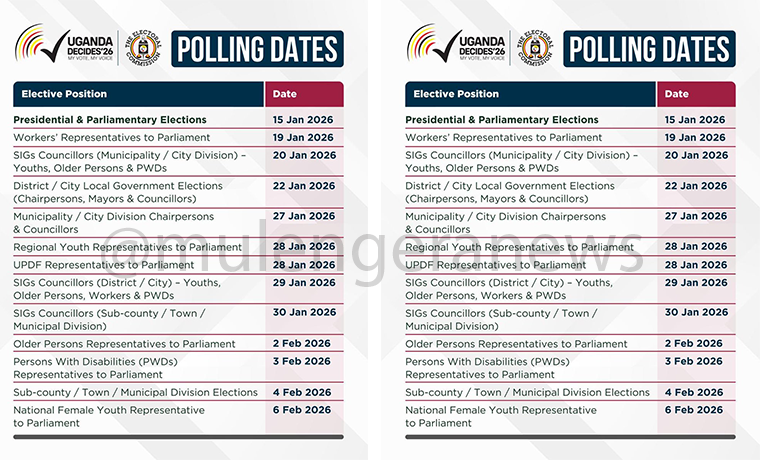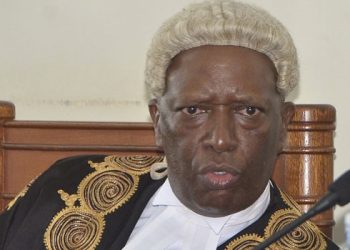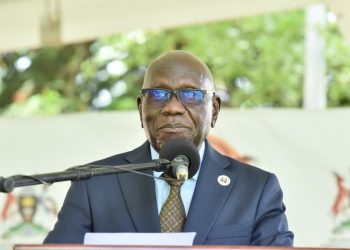By John V Sserwaniko
President Museveni has already walked the talk practically demonstrating that he means well on matters to do with the independence of the Judiciary. We can reliably reveal that, having interacted with some donor representatives in Kampala, Museveni two weeks ago rang Deputy Attorney General Mwesigwa Rukutana and directed him to ensure the much-awaited Administration of the Judiciary Bill is expeditiously passed. The donor pressure on him has been complimentary to efforts by Chief Justice Bart Katureebe who has been pestering Museveni to do something to improve judicial officers’ welfare while still in and after service. Katureebe has also done a lot of lobbying among the donor community in Kampala including travelling to several EU countries that have been funding Justice Law & Order Sector for years through JLOS. He has also been hosting influential diplomats and donor representatives at his Nakasero residence to talk over these things. That shows leadership.
Back to M7:
Like any other loyal servant, Rukutana has immediately complied with the President’s directive and last Monday he took the Bill to Cabinet, telling colleagues it’s something the President was very much interested in. He maintained his instructions were that it must pass without any further delay. Actually on that very Monday when Cabinet passed it, Museveni was in Munyonyo addressing the Judges Conference but didn’t risk talking much about the Bill in case Cabinet dragged its feet and let him down like they sometimes do. The Bill was then instantly approved by Cabinet and the Justice Ministry has since passed it on to Parliament whose leaders are determined to ensure it’s passed quickly having been already prompted by the President.



THE GENESIS: Katureebe became CJ in April 2015 and had his first meeting with the President in July. Sources say he told Museveni it was painful becoming CJ presiding over an institution whose Judges are poorly remunerated. He gave the example of each judge being given only Shs2m per month to cater for housing and medical allowances; their families inclusive. Museveni was very disturbed and said he was hearing this for the first time. He instantly rang PSST Keith Muhakanizi and the Finance Minister insisting the judges’ allowances must immediately be enhanced from Shs2m to Shs4m. Because it was immediate, Muhakanizi had to find an initial supplementary of Shs5bn and all judicial officers’ monthly allowances were immediately increased 100%. In their subsequent interactions, Katureebe told Museveni much as the situation was now better, a lot more remained undone especially concerning the judges’ retirement benefits. He told him there are many countries where benchmarking can be done including Tanzania. Katureebe explained to Museveni how some colleagues had, on retirement, received as low as Shs5m as their retirement package because it was being calculated basing on how long one has been on the bench.
WHY IS THIS SO?
In practice, many lawyers are appointed judges in the evening of their life and have to retire at 70. This means a senior lawyer who becomes Judge at 60, he/she will only work for 10 years and reach retirement age in which case his pension will be a fraction of the salary he has been earning in the 10 years preceding his retirement (70 years). Katureebe told Museveni there was need for a more equitable way to provide for judicial officers in retirement. This has many benefits including enhancing efficiency and most importantly taming corruption tendencies.


THE TANZANIAN MODEL:
Katureebe told Museveni of how it’s done in Tanzania where judges continue monthly earning 80% of their former salary once in retirement. The two agreed to discuss this matter more in the annual Judges Conference which was barely 5 months away. This would allow Katureebe to prepare and exchange with the president more detailed documents on the benchmarking. So in Katureebe’s first Judges Conference (early 2016), Museveni, responding to a speech the CJ had just made, said: “But why only 80%? I think we can improve on the Tanzanian situation by giving our judges 100% salary in retirement.” As the Judges cheered him on, the President gave reasons to justify his generous offer. “Many of them fall sick in old age and you find they can’t even look after themselves,” he said giving the example of former Deputy Chief Justice Leticia Kikonyogo who (confined in a wheel chair) was living in her home in Lweza spending a lot of money on medication. She died recently. But Katureebe told Museveni for this and much more to be achieved, there is need for a comprehensive law (aka The Administration of the Judiciary Act). He told the President about the Administration of Parliament Act that among other things created and empowered the Parliamentary Commission which independently goes about resource mobilization and financing of its activities. Museveni then prompted officials at the Justice Ministry to begin working though progress has curiously been very slow (largely because of the Finance Ministry’s hostility to the Bill). But it’s not something Museveni could dodge forever because Katureebe would demand for this Bill each time he meets him.
OTAFIIRE’S ROLE
Justice Minister Kahinda Otafiire, whose outspokenness in marketing Magyezi Bill Museveni must reciprocate in some way, has equally been very supportive. The Bill will also make the Judiciary autonomous as envisaged in the relevant provisions of the Constitution. This bill will operationalize those provisions. There will be a Judiciary Fund and the institution will be able to attract funding over and above what government provides in Matia Kasaijja’s budget. Just like the Administration of Parliament Act did in the case of the legislature, the Administration of Judiciary Act (once enacted) will make it impossible for the executive to for example veto their budget. The retirement benefits scheme for the judges, which the guys at finance have been resisting as very expensive, will now be an addendum to the Act. We have also seen a letter Museveni recently wrote to Matia Kasaijja asking him to closely work with Rukutana to ensure all that resistance by his technocrats is overcome and the Certificate of Financial Implications is immediately released. One of the arguments that has been made to overcome resistance at Finance ministry is that the cost of living has long skyrocketed and the exchange rate as well; for instance as of the 1990s when the judges’ medical and housing allowances was first consolidated at Shs2m, you needed $2,000 to get Shs2m. Today you need only $600! To increase pressure on Museveni while driving the point home, Katureebe tactifuly got the President to agree to drive to Munyonyo where he sat for the whole day in a private room and met all the judges one by one to hear their personal problems and fears of life after service. This experience made Museveni realize that Kikonyogo, whose wheel chair confinement he was very sympathetic about, was after all not the worst affected judge.
RUKUTANA EXPLAINS:
While addressing judges and lawyers at the Monday opening of the new law year, Rukutana arrayed fears that the bill is going to be stood over again like before. “I can assure you it’s going to pass very fast. The president is behind it and cabinet. It’s now a matter of Parliament doing the rest,” he said citing a number of other examples to show that the President was determined to fortify the independence of the Judiciary beyond just the Bill. “As you know by now, we are going to have a government plaza where all MDAs will be housed in one stop center but an exception has been created for the judiciary because of its peculiar nature. Your headquarters is going to be in Naguru and the contract is going to be awarded soon.” He added that, besides creating more magisterial areas (to 81) and originating regulations increasing the number of High Court judges from 49 to 82, his ministry had also convinced cabinet to create a waver lifting the ban on recruitment to enable the Judiciary to recruit additional staff to compliment the new structure. He said the public service ministry has already approved the new judiciary structure and funding is available. He added that to solve the infrastructure problem and deepen access to justice by the masses, 4 JLOS centers would annually be constructed having a one stop center for all sister agencies like the police and DPP in one place. He begged the lawyers to compliment these efforts by the executive by partnering with the bench to identify, expose and isolate the corrupt members of both the bar and bench. Watch this space for more reporting on the judiciary to follow! To comment on this and other Mulengera news stories, call/text 0703164755
































